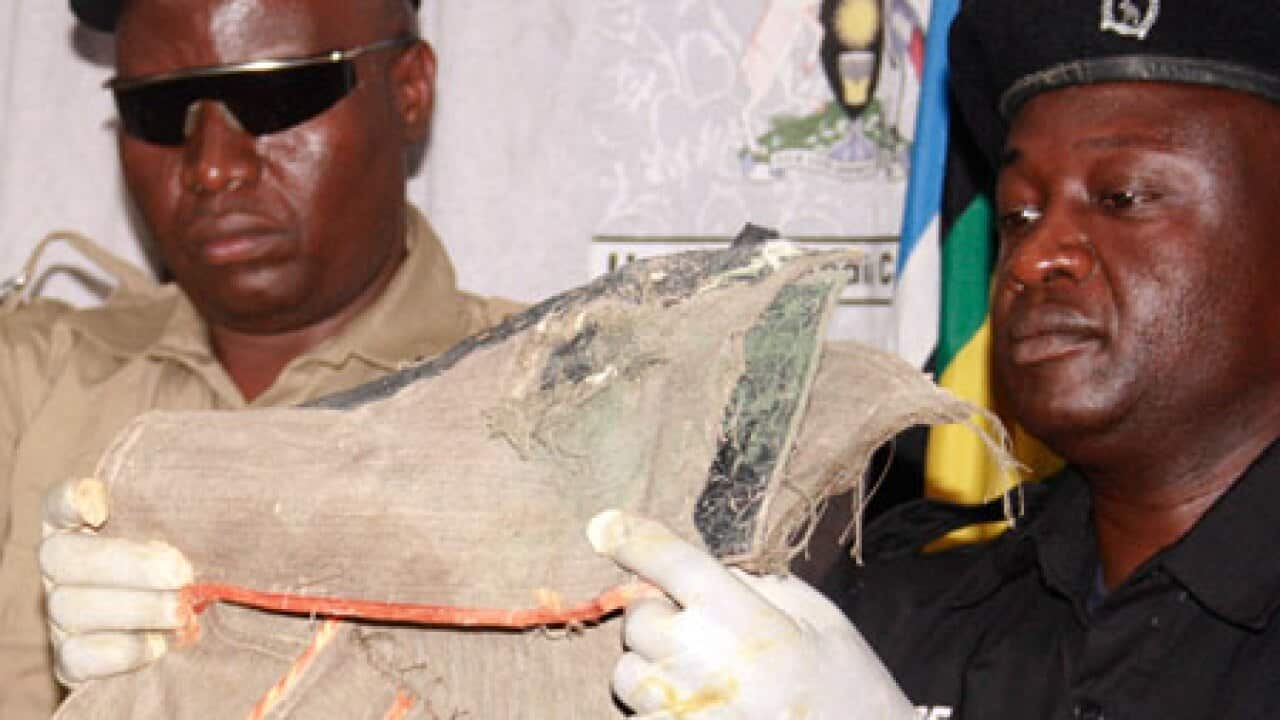The blasts that ripped through a crowded bar and a restaurant in Kampala have been claimed by Al-Qaeda-inspired Shebab insurgents in Somalia, who called them retaliation for the presence of Ugandan troops in Mogadishu.
Police chief Kale Kayihura said a suicide vest, laden with explosives and fitted with a detonator, had been found packed in a black laptop bag at a club in Kampala's Makindye district.
"We have established that what was found at the discotheque was in fact a suicide vest, and it could also be used as an IED" or improvised explosive device, he told reporters.
Several arrests have been carried out, but Kayihura did not specify how many, nor did he give their identities.
While the bombers' modus operandi appeared to support the Shebab's claim of responsibility, the police chief pointed a finger at a homegrown Muslim rebel group known as the Allied Democratic Forces (ADF).
"Shebab is linked with ADF," he said. "ADF is composed of Ugandans, Shebab and ADF are linked to Al-Qaeda."
But Ismael Rukwago, a senior ADF commander based in Democratic Republic of Congo, denied any involvement.
"We are not part of this thing, we are absolutely denying. We have no reason, these are innocent people," he said, adding that his group has repeatedly called for peace negotiations with Kampala.
The bombings, for which the death toll had risen to 76 overnight, were the deadliest in East Africa since Al-Qaeda attacks against the US embassies in Kenya and Tanzania in 1988.
They were the first ever attack by the Shebab outside Somalia, marking an unprecedented internationalisation of Somalia's 20-year-old civil conflict.
"We are behind the attack because we are at war with them," Ali Mohamoud Rage, the Shebab group's spokesman, told reporters in Mogadishu.
The movement's top leader had warned in an audio message earlier this month that Uganda and Burundi would face retaliation for contributing to an African Union (AU) force supporting the western-backed Somali transitional government.
The Shebab accuse the AU force (AMISOM) of killing civilians during its operations around the tiny perimeter of Mogadishu housing President Sharif Sheikh Ahmed's embattled administration.
"We will continue the attacks if they continue to kill our people," Rage said. "This was a defensive measure against the Ugandans who came to our country and killed our people. This was retaliation for their actions."
The Ugandans were the first to deploy to Somalia in early 2007.
Burundi, which also has troops in the war-wracked Somalia, said they had stepped up security in response to the Shebab's threat.
"We want to reassure the Burundian population. We have taken the necessary measures and adopted strategies that I cannot reveal," army spokesman Gaspard Baratuza told AFP.
Kenya, which shares a long and porous border with Somalia, also said it would thwart any attacks by the Islamists who have in the past warned they would attack Nairobi.
"We will be ready and available to repulse any threats to the security and tranquillity of this county," Foreign Minister Moses Wetangula told parliament.
"This government and the people of Kenya will neither fear to act nor act in fear in fighting against terrorism."
The Shebab achieved multiple goals with the bombings: they hit the country providing the backbone of a force which is thwarting their final push for power and they cast a pall on the upcoming AU summit to be hosted by Uganda.
They notably struck an Ethiopian restaurant -- Ethiopia invaded Somalia in 2006 and is the Shebab's arch-foe -- and killed people watching football, an activity they have banned as "un-Islamic" in Somalia.
The leadership of Somalia's embattled transitional federal administration were quick to condemn the attacks and urge the international community to remain steadfast in its support and not yield to pressure to pull troops out.
Share

